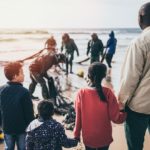 Resilience is one of the most sought-after qualities in the modern workplace. Perhaps unsurprisingly, it’s a quality that refugees often possess in abundance. For instance, research published earlier this year highlighted the various ways in which resilience manifests itself among refugees, often depending upon the unique characteristics of each individual.
Resilience is one of the most sought-after qualities in the modern workplace. Perhaps unsurprisingly, it’s a quality that refugees often possess in abundance. For instance, research published earlier this year highlighted the various ways in which resilience manifests itself among refugees, often depending upon the unique characteristics of each individual.
It provides a useful reminder that while we can easily fall into the trap of discussing refugees as a homogenous group, the reality is far more nuanced, and so too is the resilience they possess. Researchers from Washington University in St. Louis have developed a Self-Reliance Index that aims to track the self-reliance of refugees over time.
“Humanitarian actors are increasingly recognizing the need to shift focus from providing refugees with immediate assistance to promoting their ability to obtain sustained self-reliance. Until now, we haven’t had a comprehensive tool to measure progress toward this goal,” the researchers say.
“The Self-Reliance Index is unique in that it provides a holistic picture of a household’s self-reliance, beyond just economic indicators, allowing policy makers and practitioners to track changes over time,” they continue.
Measuring resilience
The index measures resilience across 12 domains that collectively aim to understand how able a refugee family is to stand on its own two feet. The domains include things such as access to food, housing, employment, and education, as well as social capital and financial resources.
The tool was developed over a couple of years with support from organizations such as RefugePoint and the Women Refugee Commission. It’s designed to be adaptable to different settings while maintaining relevance globally and was initially piloted in Mexico, Jordan, and Kenya.
From this start point, the tool has grown to be used in over 20 settings around the world to help not only gain a more nuanced insight into refugees, but also support policy efforts and even to screen for program eligibility.
“Ultimately, we hope the Self-Reliance Index can help the humanitarian field move beyond stop-gap programming to support refugees to thrive as self-sufficient, actively engaged members of society,” the researchers conclude.